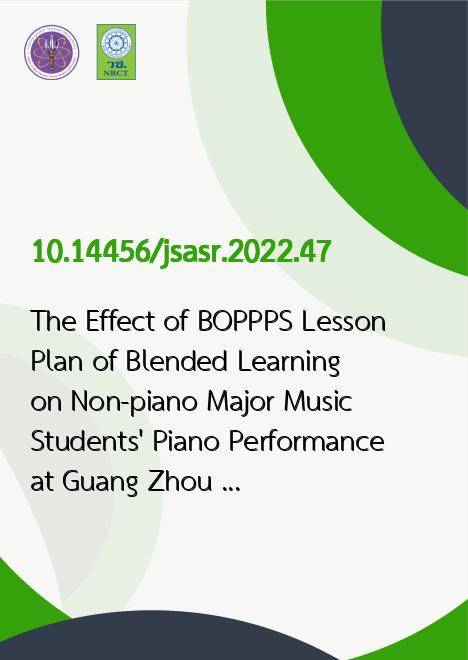
|
The Effect of BOPPPS Lesson Plan of Blended Learning on Non-piano Major Music Students’ Piano Performance at Guang Zhou University, People Republic of China |
|---|---|
| รหัสดีโอไอ | |
| Creator | Zan Zhao |
| Title | The Effect of BOPPPS Lesson Plan of Blended Learning on Non-piano Major Music Students’ Piano Performance at Guang Zhou University, People Republic of China |
| Contributor | Athipat Cleesuntorn |
| Publisher | DR.KEN Institute of Academic Development and Promotion. |
| Publication Year | 2565 |
| Journal Title | International Journal of Sociologies and Anthropologies Science Reviews |
| Journal Vol. | 2 |
| Journal No. | 6 |
| Page no. | 93-106 |
| Keyword | BOPPPS Lesson Plan, Group Piano Blended Learning, Non- Piano Major Music Students, Piano Performance, Self-Efficacy, 91suke platform |
| URL Website | https://so07.tci-thaijo.org/index.php/IJSASR/about |
| Website title | https://so07.tci-thaijo.org/index.php/IJSASR/article/view/2115 |
| ISSN | 2774-0366 |
| Abstract | Piano group courses help today's music students prepare for their practical career applications in many music fields (education, performance, therapy, etc.) in the future, however, with the progress of science and technology, higher education can use information technology to provide students with more opportunities and higher learning quality. Thus, this research aims to investigate the relationship between self-efficacy and piano performance of non-piano major music students after implementing the 8-week BOPPPS blended piano group learning lesson plan. a quasi-experiment and quantitative research method were adopted for the teaching of blended piano group lessons for 8 weeks on the 91suke teaching platform under the theoretical guidance of the BOPPPS(bridge-in, objects, pre-assessment, participatory learning, post-assessment, and summary) teaching model. The purposes of this research were to 1) confirm whether this blended teaching plan can improve students' piano performance and students' sense of self-efficacy towards piano courses; 2) To explore whether students' self-efficacy is related to their piano performance. The participants were 60 non-piano major freshmen aged 18-21 from the Faculty of Music and Dance, Guangzhou University, China. 30 samples were allocated to the control group, and the other 30 samples were to the experimental group. The control group used traditional teaching methods, while the experimental group used blended teaching methods. The paired sample t-test and correlation analysis were used for the hypothesis test. The results showed that the before and after experiment differences in piano performance scores (including piano performance skills) and self-efficacy of the experimental group students were significant compared with the control group, and the two were correlated. Therefore, the blended piano lesson plan is an effective way to improve students' piano performance. In addition, students' self-efficacy is also a related factor that affects students' piano performance scores. |
